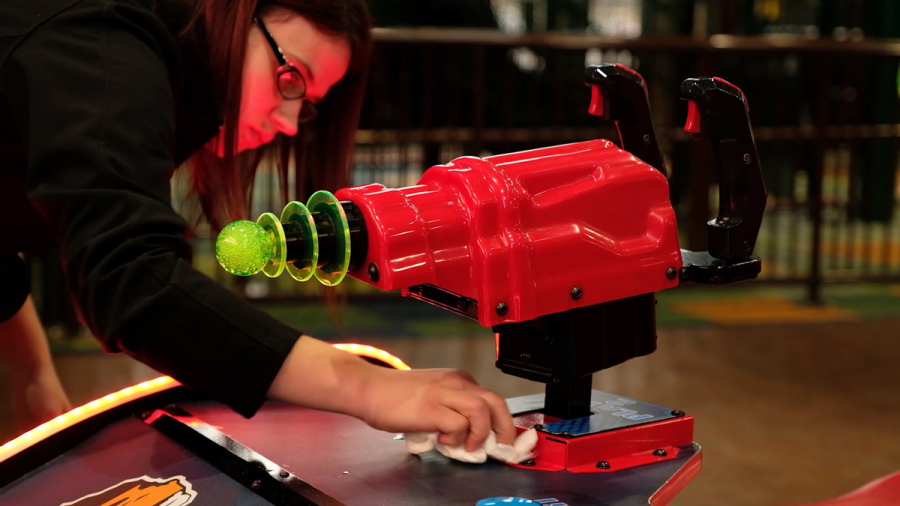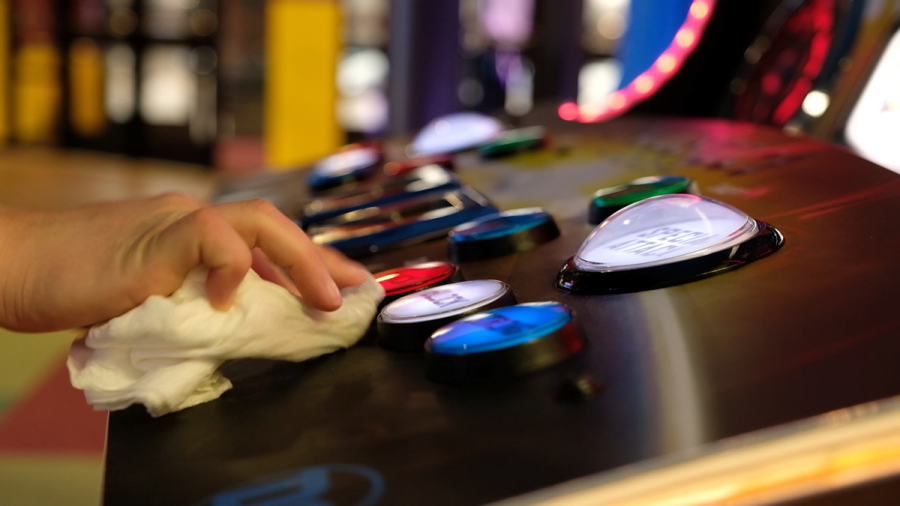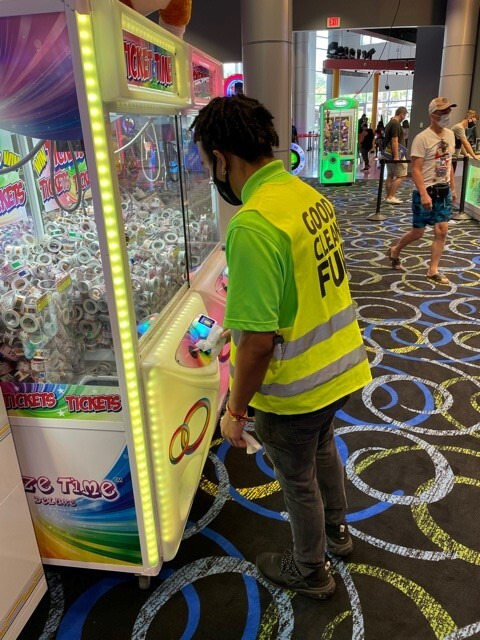Keeping FECs Clean and Sanitized

Allevity Entertainment only had its doors open for a few weeks before the pandemic hit the U.S. last winter. The initial COVID-19 surge forced the new family entertainment center (FEC) in Aberdeen, South Dakota, to suspend its operations for about two months.
When the facility reopened in mid-May 2020, the FEC had instituted numerous additional sanitizing measures to keep guests safe and staff feeling comfortable.
“The industry always has been focused on cleanliness and safety,” says David Novstrup, Allevity’s general manager and co-owner. “Those are always the goals, and the pandemic just made us emphasize it even more. Our customers expected us to.”
Novstrup and Randy Schneider, district manager for Itasca, Illinois-based Family Entertainment Group, describe ways to keep FECs clean and sanitized, especially on the many high-touch areas like knobs, balls, buttons, levers, joysticks, throw rings, and gaming zappers.

- Implement Thorough Employee Training
Staffers can’t be expected to know all the ins and outs of best practices for cleaning and sanitizing equipment, says Novstrup, who developed a guide to help rookie team members. During onboarding, his staff receive detailed training on how to answer guest questions on the FEC’s efforts and the right and, importantly, the wrong way to sanitize surfaces. For example, the chemicals used hourly on the laser tag vests and all 45 of the arcade games must be diluted with water first. The staffers also need to spray the substance on the rag—not directly on the machines—to help prevent damaging the equipment. - Make All the Efforts Noticeable
Family Entertainment Group, which owns and operates the In the Game and Bonkers brands, has two dedicated staff members on every shift sanitizing the games, equipment, and kiosks as much as possible after each use, Schneider says. Not only that, these employees wear highly visible neon green vests that read, “Good. Clean. Fun!”
“Everyone sees them focusing on those important points of contact,” he says. “It makes guests feel comfortable playing that game and feel comfortable coming back to the facility. They also know they can ask these staff members questions about our sanitization practices and the cleaning products used.” - Educate the Guests
Beyond these dedicated staff cleaners, Family Entertainment Group’s FECs strategically place employees right at the entrance as a way to provide further guidance on topics like the locations of hand sanitizer stations.
“They are the first point of contact,” Schneider says. “We give guests the basic awareness of all procedures currently in place, and they can ask any questions they may have to make them feel better about their visit.” - A Shared Responsibility
Allevity staff also are well versed in discussing the FEC’s sanitization measures, including monthly use of a hospital-grade antimicrobial coating on all its high-touch surfaces. However, the FEC lays out customer expectations with signage too.
“It’s a two-way street,” Novstrup stresses. “We can do everything that people should expect, but guests must continue to wash their hands, use the sanitizer stations, and not visit us if they’re feeling sick.” - Think About the Big Picture
Joysticks, virtual reality (VR) headsets, and kiosks may be some of the more obvious high-touch surfaces to sanitize, but FEC staff should keep in mind all the components of each machine, Novstrup says. For instance, a basketball shooter game goes beyond just wiping down the start button; all the balls should be regularly sanitized as well. - The Cost of Doing Business
With many facilities, a greater emphasis on sanitization has led to increased maintenance costs and fading colors on equipment. FECs likely will just have to accept this as another facet of dealing with the pandemic, Schneider says. “Using any chemical on plastic will cause it to wear much quicker. We have to replace buttons a lot more than we normally would. It’s something we anticipated, and it’s well worth the steps for the extra sanitization.” - Operating in the New Normal
FECs should never stop researching different methods and techniques to keep their facility clean and safe, says Novstrup, noting facilities also must stay diligent—as well as be nimble—during these uncertain months ahead. “You do not want to let your guard down, and you have to evolve and change your procedures if cases or guest concerns go up.”
Regardless of how exactly the future plays out, Schneider can’t imagine his FECs pulling back on their current strict cleaning, sanitizing, and disinfecting measures even after the pandemic ends. “We will keep those practices going because they are the best practices,” he says.

